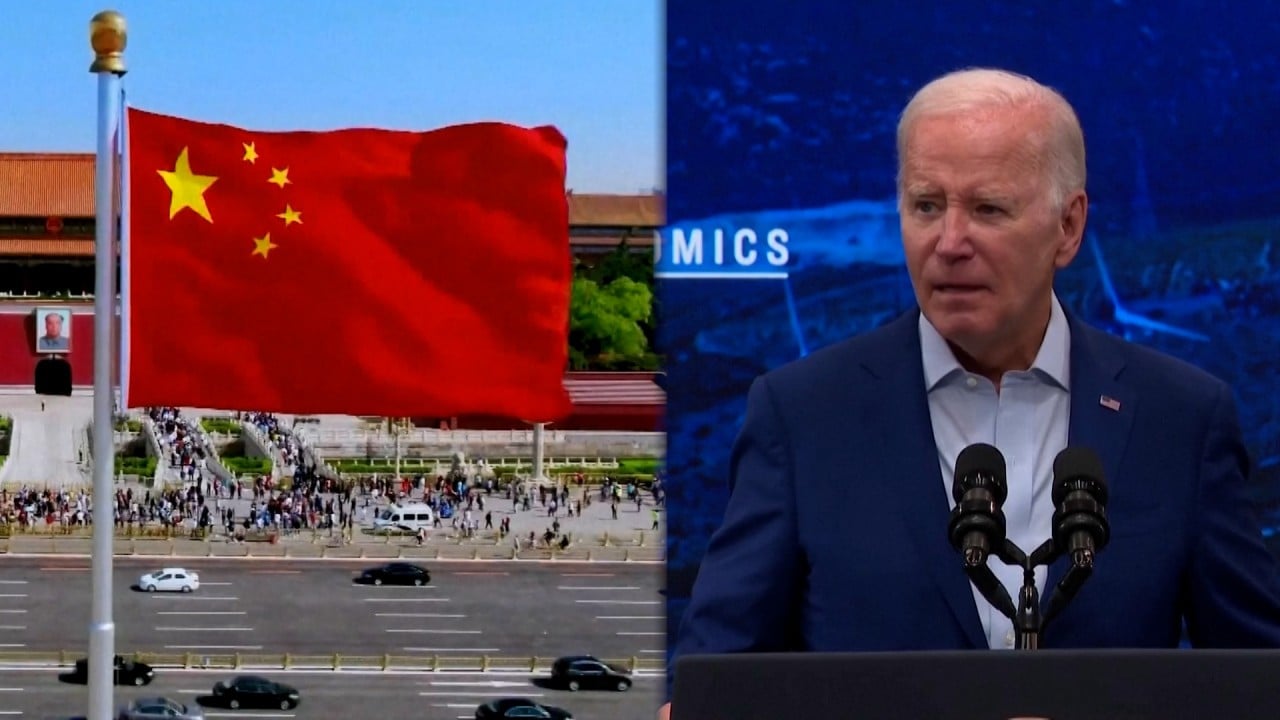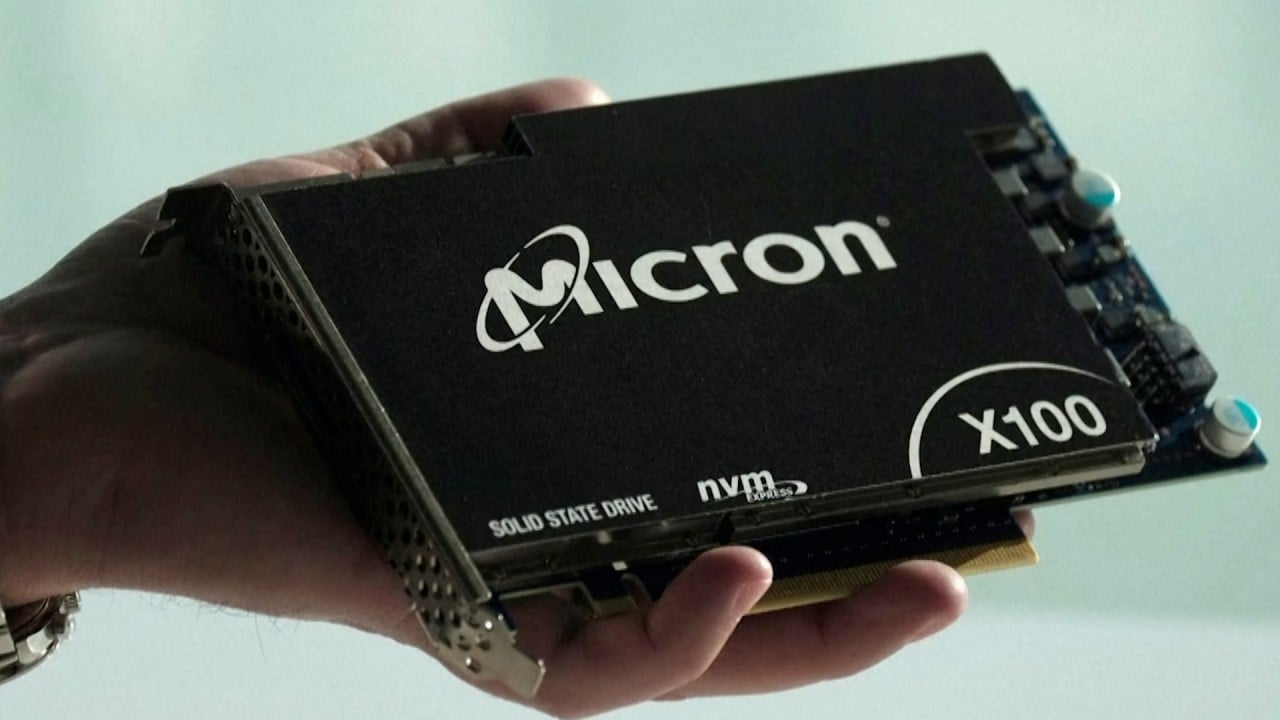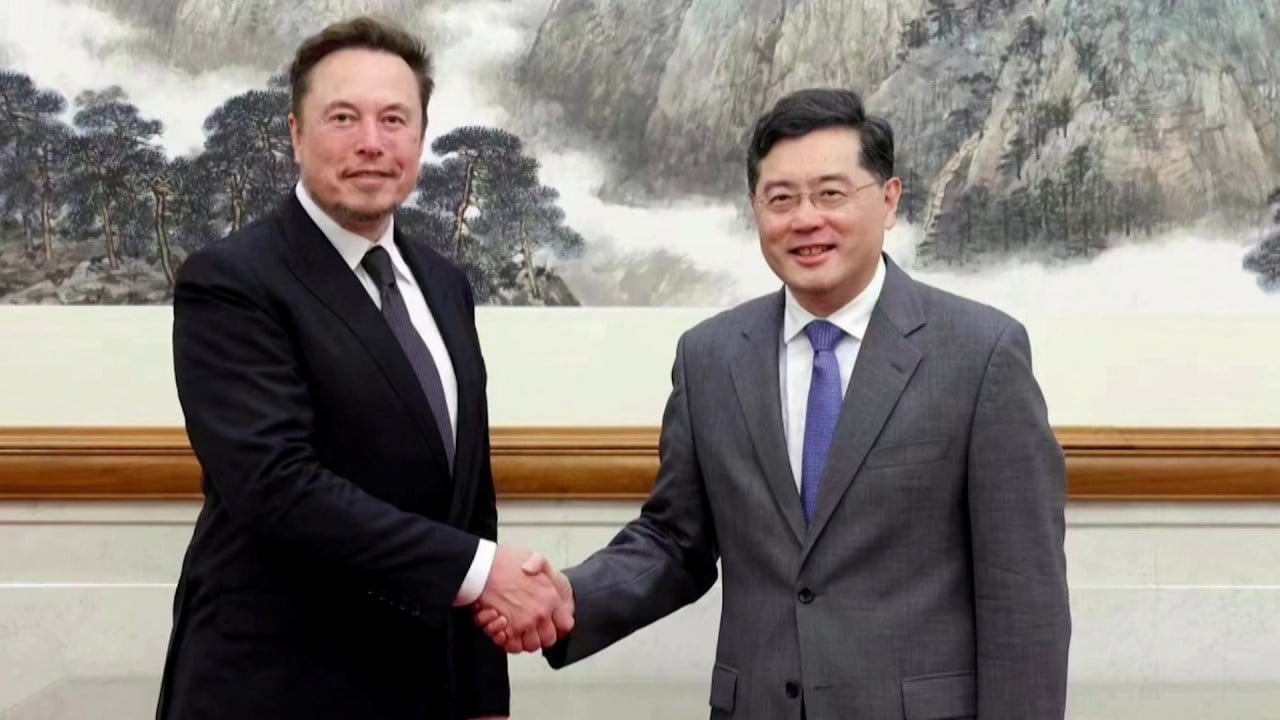
01:56
Biden to introduce new restrictions on US investments in China, declares tech ‘emergency’
US tech-investment curbs have China gravely concerned, with already shrinking FDI looking even less attractive
- US President Joe Biden signed an executive order to restrict US venture capital and private equity stakes in Chinese firms in key areas, including semiconductors
- China’s Ministry of Commerce said the US restrictions were moves to ‘decouple and sever supply chains under the cover of eradicating national risks’
The latest “small yard, high fence” investment restrictions by the United States on China would choke venture capital and dwindle foreign direct investment inflows into the world’s second-largest economy, while also hitting its technological advancement, analysts said.
The latest restrictions are intended to curb US venture capital and private equity investments in Chinese companies covering semiconductors and micro electronics, quantum information technologies and certain artificial intelligence (AI) systems.
[The] US is defying its advocacy of maintaining the market economy with the principle of fair competition
China’s Ministry of Commerce responded on Thursday, saying the US restrictions were moves to “decouple and sever supply chains under the cover of eradicating national risks”.
“[The] US is defying its advocacy of maintaining the market economy with the principle of fair competition, affecting ordinary business decisions of companies, destroying international trade orders and seriously disrupting the safety of global supply chains,” the ministry said.
“China expresses grave concerns on this matter and we reserve the right to take measures regarding the situation.”
Washington, as part of the ongoing tech rivalry, has already blocked China’s access to core US-controlled technologies, including semiconductors, and halted grants from US hi-tech companies that produce “advanced chips” in China.
Biden limits US investments in China tech, makes ‘emergency’ declaration
The new investment screening mechanism, which requires the US Department of the Treasury to be notified about any outbound capital flows in selected areas, is set to be the first to curb US financial investment in hi-tech industries in China.
Alfredo Montufar-Helu, head of The Conference Board’s China Centre for Economics and Business, said the US has intensified the moves to set high bars against China’s access to sensitive technology instead of a full decoupling.
The restriction of certain technologies now is likely to impair the innovation potential of certain commercial products over the next decade
But he noted that “how high will the fence be” would be an issue sticking out as “everything suggests that US authorities intend to make this ‘fence’ unscalable”.
“[While] the ‘yard’ is supposed to remain small, the restrictions might spillover into theoretically non-sensitive areas, such as autonomous driving, synthetic biology and climate science,” he added.
“The restriction of certain technologies now is likely to impair the innovation potential of certain commercial products over the next decade.”
According to the Rhodium Group, the value of US foreign direct investment in China was US$8 billion last year – the lowest since 2005.
Will ‘small-scale dip’ in China’s FDI inflow fuel a big crisis of confidence?
The value of US venture capital investments in China was US$1 billion last year, compared to a high of US$19 billion in 2018, according to the think tank.
He Jun, a senior researcher with a focus on Chinese technology and the economy at the Beijing-based Anbound Consulting, said that investment restrictions would hit China’s hi-tech industry because “the details were designed very directly targeting Chinese companies”.
“Right now, the Chinese venture capital market is shrinking, foreign investment has shrunken by a chunk and what is left is mainly state-backed funding,” he said.
“It is becoming more and more of a closed-loop market. This is bad for China’s venture capital industry, as well as for the development of hi-tech industries.”
A co-founder of a mainland China-based private equity firm, who asked to remain anonymous due to the sensitivity of the issue, was also sceptical about the future development of Chinese hi-tech companies.
“The biggest source of finance in our sector would be from the US and in US dollars. Even if we do not source money from the US, it means the companies we invest in might find it more difficult to be backed by other US-related finances in the future,” he said.
He added that the restrictions are set to limit how Chinese companies can grow and how successful they can be.
“It will be felt not just in their next round of financing, but all the way until when it becomes an [initial public offering],” he said.
How much is China’s foreign direct investment, is it still a good destination?
China has already experienced a significant pullback from US private equity and venture capital investments in 2022 due to its coronavirus lockdowns and broader geopolitical tensions.
They dropped by around 76 per cent, year on year, to US$7.02 billion in 2022 from US$28.92 billion a year earlier, according to S&P Global Market Intelligence data published in February.
Huo Jianguo, the former head of a think tank under China’s Ministry of Commerce, said that if US investors pulled further back in response to Wednesday’s executive order, “investment from other countries could hardly fill in the gap”.
In the second quarter, China’s direct investment liabilities – one measurement of foreign direct investment (FDI) – plunged by 87 per cent from the same period last year to a historical low of US$4.9 billion, according to figures released by the State Administration of Foreign Exchange on Friday.
It will be important to see how the executive order defines AI with potential military end-use applications
Stephen Olson, a senior fellow at Hinrich Foundation, said the latest US measures would “certainly not improve China’s attractiveness to foreign direct investment providers”.
Although the current information reflected that “only a small slice of US FDI into China will be directly and substantially impacted”, Olson added that there are “anticipated future restrictions that could be imposed by the US, as well as any counterpunches China might direct at US business in response”.
Reva Goujon, director at Rhodium Group, said that the executive order should be viewed as an initial step, outlining the strategic intent of capturing US capital and know-how in force-multiplying technologies that could be used by adversaries towards military end-use purposes.
“It will be important to see how the executive order defines AI with potential military end-use applications,” she added.
“I will also be watching for how the executive order defines covered transactions, for example, will it avoid retroactive review as rumoured? Will it set a [minimal] threshold? How will it draw the line between active and passive investment?”
US, allies must keep ‘eye on the ball’ with China tech curbs: commerce chief
The Conference Board’s Montufar-Helu added that the investment restrictions “will for sure have a negative impact on FDI into China, in targeted sectors and areas”.
“And it won’t only be investment coming from the US, but also from other economies due to the extraterritorial nature of the restrictions,” he said.
“This will exacerbate the negative impact that China’s softening demand and the global growth slowdown are already having on China’s inward FDI levels.”
In terms of merger and acquisition activities, Rhodium Group expects the outlook will remain dim this year.
“But we’ll also be carefully examining transactions moving forward for signs of defensive investments in China, that is multinationals furthering localisation plans in response to growing regulatory pressures,” Goujon added.
In the face of the restrictions, “Beijing has not been starving for capital” and “can continue to pump funding into strategic industries”, she said.
“But if that capital isn’t utilised effectively, then it’s only compounding its gargantuan debt problems,” said Goujon.
Companies from third countries are not pleased about losing out on the lucrative China market
In the long run, Olson at Hinrich Foundation said companies “will look for and probably find work around solutions that will allow them to serve the China market without running afoul of US restrictions”.
“Companies from third countries are not pleased about losing out on the lucrative China market,” he added.
“And finally, any restriction regime will inevitably experience leakage and circumvention over time.”




